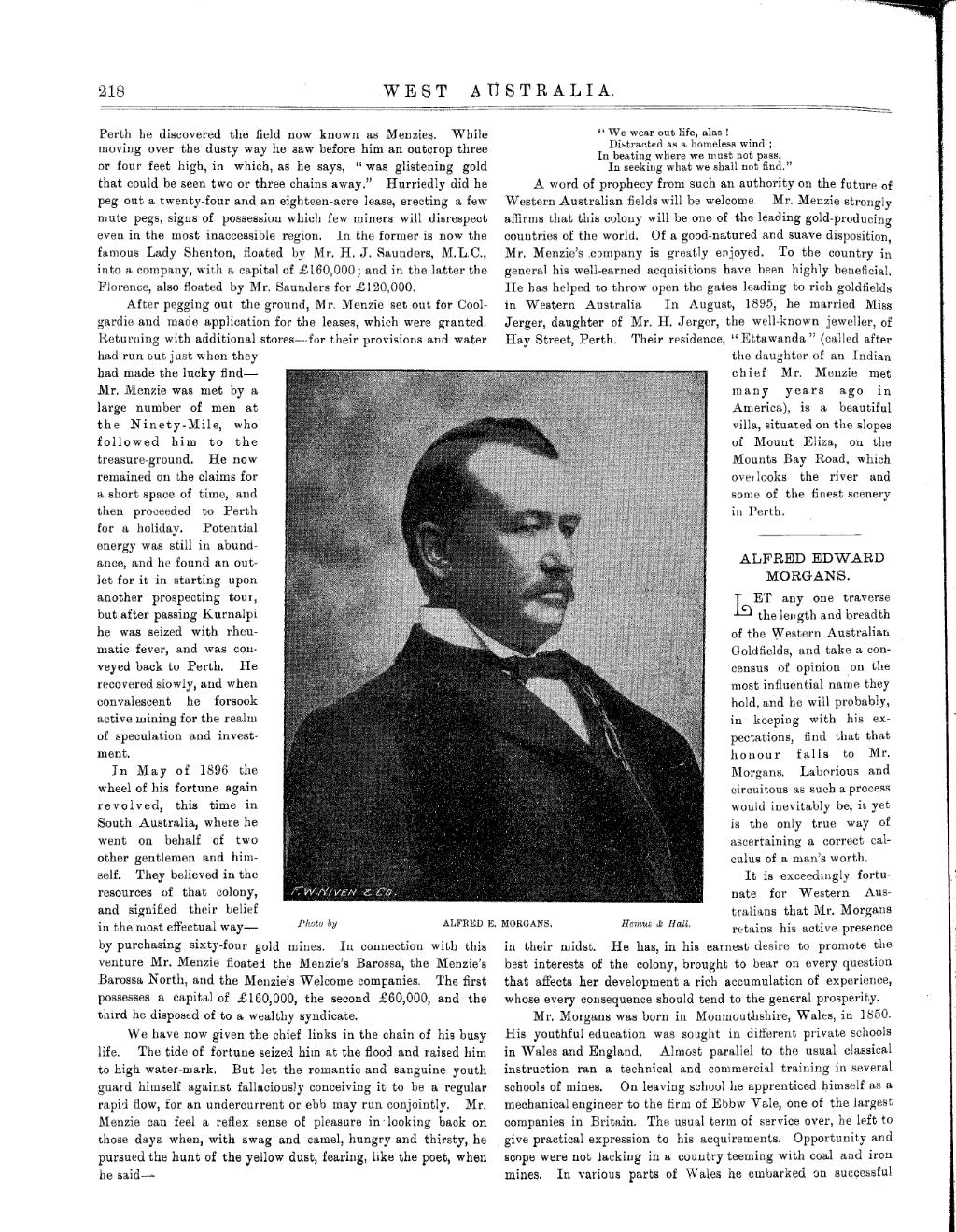Perth he discovered the field now known as Menzies. While moving over the dusty way he saw before him an outcrop three or four feet high, in which, as he says, "was glistening gold that could be seen two or three chains away." Hurriedly did he peg out a twenty-four and an eighteen-acre lease, erecting a few mute pegs, signs of possession which few miners will disrespect even in the most inaccessible region. In the former is now the famous Lady Shenton, floated by Mr. H. J. Saunders, M.L.C., into a company, with a capital of £160,000; and in the latter the Florence, also floated by Mr. Saunders for £120,000.
After pegging out the ground, Mr. Menzie set out for Coolgardie and made application for the leases, which were granted. Returning with additional stores—for their provisions and water had run cut just when they had made the lucky find—Mr. Menzie was met by a large number of men at the Ninety-Mile, who followed him to the treasure-ground. He now remained on the claims for a short space of time, and then proceeded to Perth for a holiday. Potential energy was still in abundance, and he found an outlet for it in starting upon another prospecting tour, but after passing Kurnalpi he was seized with rheumatic fever, and was conveyed back to Perth. He recovered slowly, and when convalescent he forsook active mining for the realm of speculation and investment.
In May of 1896 the wheel of his fortune again revolved, this time in South Australia, where he went on behalf of two other gentlemen and himself. They believed in the resources of that colony, and signified their belief in the most effectual way—by purchasing sixty-four gold mines. In connection with this venture Mr. Menzie floated the Menzie's Barossa, the Menzie's Barossa North, and the Menzie's Welcome companies. The first possesses a capital of £160,000, the second £60,000, and the third he disposed of to a wealthy syndicate.
We have now given the chief links in the chain of his busy life. The tide of fortune seized him at the flood and raised him to high water-mark. But let the romantic and sanguine youth guard himself against fallaciously conceiving it to be a regular rapid flow, for an undercurrent or ebb may run conjointly. Mr. Menzie can feel a reflex sense of pleasure in looking back on those days when, with swag and camel, hungry and thirsty, he pursued the hunt of the yellow dust, fearing, like the poet, when he said
"We wear out life, alas!
Distracted as homeless wind;
In beating where we must not pass,
In seeking what we shall not find."
A word of prophecy from such an authority on the future of Western Australian fields will be welcome. Mr. Menzie strongly affirms that this colony will be one of the leading gold-producing countries of the world. Of a good-natured and suave disposition, Mr. Menzie's company is greatly enjoyed. To the country in general his well-earned acquisitions have been highly beneficial. He has helped to throw open the gates leading to rich goldfields in Western Australia. In August, 1895, he married Miss Jerger, daughter of Mr. H. Jerger, the well-known jeweller, of Hay Street, Perth. Their residence, "Ettawanda" (called after the daughter of an Indian chief Mr. Menzie met many years ago in America), is a beautiful villa, situated on the slopes of Mount Eliza, on the Mounts Bay Road. which overlooks the river and some of the finest scenery in Perth.
ALFRED EDWARD MORGANS.
 |
Photo by ALFRED E. MORGANS. Hermes & Hall. |
LET any one traverse the length and breadth of the Western Australian Goldfields, and take a concensus of opinion on the most influential name they hold, and he will probably, in keeping with his expectations, find that that honour falls to Mr. Morgans. Laborious and circuitous as such a process would inevitably be, it yet is the only true way of ascertaining a correct calculus of a man's worth. It is exceedingly fortunate for Western Australians that Mr. Morgans retains his active presence in their midst. He has, in his earnest desire to promote the best interests of the colony, brought to bear on every question that affects her development a rich accumulation of experience, whose every consequence should tend to the general prosperity.
Mr. Morgans was born in Monmouthshire, Wales, in 1850. His youthful education was sought in different private schools in Wales and England. Almost parallel to the usual classical instruction ran a technical and commercial training in several schools of mines. On leaving school he apprenticed himself as a mechanical engineer to the firm of Ebbw Vale, one of the largest companies in Britain. The usual term of service over, he left to give practical expression to his acquirements. Opportunity and scope were not lacking in a country teeming with coal and iron mines. In various parts of Wales he embarked on successful
